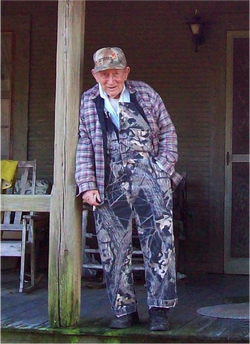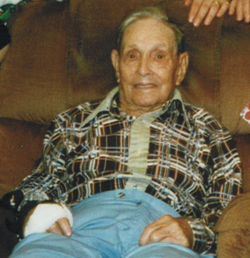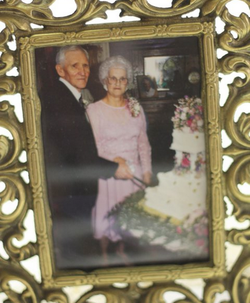
Custom Search
Thomas Carl "Stump" Easley (1926 - 2010)

Stump Easley
While it's fair to say that we've learned much of what we know from resources such as those listed on our "Resources" page, it's also fair to say that had it not been for the influence of Mr. Thomas Carl "Stump" Easley we'd likely still be living in a subdivision, carrying on the suburban lifestyle we'd led prior to meeting him, knowing nothing about homesteading, or even caring to know. Perish the thought.
Mr. Stump was our Louisiana neighbor at our last place of residence there. Living just a few doors down in the semi-rural area of the city, Mr. Stump lived as if he were in the middle of nowhere, gardening, raising chickens...and raising dairy goats.
He knew more about living a self-sufficient lifestyle than could ever be written down, and we are so thankful that he "took a liking" to us and shared freely from his deep knowledge and experience.
His love of dairy goats was contagious, and we caught a flaming case of it from which we are likely never to recover. We hope not, anyway.
Mr. Stump was our Louisiana neighbor at our last place of residence there. Living just a few doors down in the semi-rural area of the city, Mr. Stump lived as if he were in the middle of nowhere, gardening, raising chickens...and raising dairy goats.
He knew more about living a self-sufficient lifestyle than could ever be written down, and we are so thankful that he "took a liking" to us and shared freely from his deep knowledge and experience.
His love of dairy goats was contagious, and we caught a flaming case of it from which we are likely never to recover. We hope not, anyway.
Louis "PawPaw Mr." Roth (1895-2001)

PawPaw Mr. Roth (1895-2001)
Patti's grandfather, Louis Roth, was known by most folks as "PawPaw Mr. Roth." Born in 1895, he grew up in a time when technology hadn't yet taken over the world. In fact, much of what we think of as commonplace today hadn't yet entered the mind of man in those days.
He tells of "rigging up" headlights on a car...before there were headlights on cars! He worked in a sugar cane mill as a boy, as well as in many other labor-intensive positions, all of which taught him skills and a work ethic that stayed with him until his death at the ripe old age of 106...almost making it to 107.
He could only read & write his children's names, yet retired from Exxon's Baton Rouge refinery as an electrical supervisor. Speaking of electricity, he never turned it off when working on wiring around the house. He'd often grunt as he was repairing a receptacle or replacing a light fixture, because he was getting zapped every so often while doing so. Who knows? Maybe that was the secret to his long life!
We were in awe of his ingenuity, and his knowledge of all things pertaining to gardening was both deep and wide. Of course, we learned that we'd better have a few hours to spare if we ever asked about anything, because once the stories began we knew we'd be there awhile. That was just fine with us, too, because it's not often that "history" will open up its mouth and speak - especially in a thick cajun accent - so when it does, you'd best be listening.
He tells of "rigging up" headlights on a car...before there were headlights on cars! He worked in a sugar cane mill as a boy, as well as in many other labor-intensive positions, all of which taught him skills and a work ethic that stayed with him until his death at the ripe old age of 106...almost making it to 107.
He could only read & write his children's names, yet retired from Exxon's Baton Rouge refinery as an electrical supervisor. Speaking of electricity, he never turned it off when working on wiring around the house. He'd often grunt as he was repairing a receptacle or replacing a light fixture, because he was getting zapped every so often while doing so. Who knows? Maybe that was the secret to his long life!
We were in awe of his ingenuity, and his knowledge of all things pertaining to gardening was both deep and wide. Of course, we learned that we'd better have a few hours to spare if we ever asked about anything, because once the stories began we knew we'd be there awhile. That was just fine with us, too, because it's not often that "history" will open up its mouth and speak - especially in a thick cajun accent - so when it does, you'd best be listening.
Ralph Thomas "Pappy" Alderman (1923-2005)

"Pappy" & "Granny" - 60th anniversary
Tommy's father, Ralph Thomas Alderman, known by most as "Pappy," was a WWII veteran, P.O.W., and survivor of the "Long March" (click HERE for Congressional Testimony of Dr. Leslie Caplan, Camp Physician, concerning the atrocities survived by Pappy and other P.O.W.'s while on that forced march). Although he didn't talk very much about those experiences, they shaped him to some degree into the tough bird that he was. Suffering a major heart attack in 1988, losing two-thirds of his heart in the process, surprisingly only slowed him down - but didn't stop him. After several years of ups and downs that included a stroke and many other setbacks, he found his way back to the golf course where he'd spent many-a-day in the years leading up to his heart attack. Hampered by the effects of the stroke, he learned to play one-handed. Though he never made it to "The Tour," he inspired many with his gentle, cheerful toughness, and it was said by most who knew him that he never, ever complained. Tommy's mother, Geraldine Price "Granny" Alderman, was most appreciative of Pappy's appreciation of her efforts to take care of him, and the fact that he never once complained.
Aside from setting such a great example, perhaps the most important thing Pappy passed along to Tommy was the family property in Mississippi - 116 acres that no one ever bought, having been in the family since the mid-1800's. What a gift.
Aside from setting such a great example, perhaps the most important thing Pappy passed along to Tommy was the family property in Mississippi - 116 acres that no one ever bought, having been in the family since the mid-1800's. What a gift.
Below is an audio file, converted from a cassette tape, of a 1998 interview of Pappy when he was 75, conducted by Jeremy Kirkwood for a 9th grade history project pertaining to World War II: